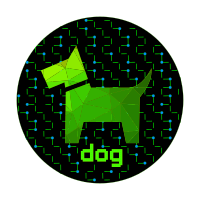
dog_agent
dog_agent is the component of dog that runs on each server, controlling its firewall.
Start
sudo systemctl start dog
Stop
sudo systemctl stop dog
Log location
/var/log/dog
Configuration files
Located in /etc/dog/
If you create config.json before you connect to dog_trainer, dog_trainer will create the host and assign it to the group specified.
config.json: configuration file
example:
{
"environment":"*", # currently unused
"group":"opengrok_qa", # dog group the host is assigned to
"hostkey":"2cf5115b7720132b40bd37cef9021f4782e2f7d1", # unique key for agent, the sha256sum of agent's public key.
"location":"*" # currenlty unused
}
The remainder are temp files, useful for debugging:
ipset.txt # global ipsets
# iptables files as received from dog_trainer:
ip6tables_iptables.txt
ip6tables_ipsets.txt
ip4tables_iptables.txt
ip4tables_ipsets.txt
iptables.txt # IPv4 iptables that is applied
iptables.back # previous IPv4 iptables
ip6tables.txt # IPv6 iptables that is applied
ip6tables.back # previous IPv6 iptables
# iptables files generated locally by dog_agent for Docker support:
iptables-docker.txt
iptables-docker-trainer-filter.txt
iptables-docker-nat.txt
iptables-docker-filter.txt
Erlang console access
Console access is disabled in dog_agent
Scripts
located in /opt/dog/scripts/
-
hashes.escript: displays hashes of local temp files
example output:
config.json:
{"environment":"*","group":"opengrok_qa","hostkey":"2cf5115b7720132b40bd37cef9021f4782e2f7d1","location":"*"}
Source: Hash:
iptables-save: 60b4c165710bfdcdbf053dd16ae55df7d6a6999955090b4eae7c4ff2e6b1ed2f
ipv4tables_ipsets.txt: 60b4c165710bfdcdbf053dd16ae55df7d6a6999955090b4eae7c4ff2e6b1ed2f
ipv4tables_iptables.txt: e3b0c44298fc1c149afbf4c8996fb92427ae41e4649b934ca495991b7852b855
ip6tables-save: ef581056117c8c0c67b40f36a5cab3de2472c6cf6ddc1314706c2f94e557492c
ipv6tables_ipsets.txt: ef581056117c8c0c67b40f36a5cab3de2472c6cf6ddc1314706c2f94e557492c
ipv6tables_iptables.txt: e3b0c44298fc1c149afbf4c8996fb92427ae41e4649b934ca495991b7852b855
ipset save: b7a27a39fe4a75f87bd5e49f623529f092edc8de3abe23d912599fdf55270a03
ipset.txt: b7a27a39fe4a75f87bd5e49f623529f092edc8de3abe23d912599fdf55270a03
Capabilities
Originally dog_agent used sudo rights. To better limit what rights dog_agent has, Linux capabilities are used instead. For systems with systemd, those capabilities are granted to the process via the service file definition
dog.service
...
[Service]
CapabilityBoundingSet=CAP_DAC_READ_SEARCH CAP_NET_ADMIN CAP_NET_RAW
AmbientCapabilities=CAP_DAC_READ_SEARCH CAP_NET_ADMIN CAP_NET_RAW
...
For systems without systemd, those capabilities are granted to special binaries available only to the dog user.
$ getcap /home/dog/bin/*
ip6tables-restore = cap_dac_read_search,cap_net_admin,cap_net_raw+ep
ip6tables-save = cap_dac_read_search,cap_net_admin,cap_net_raw+ep
ipset = cap_net_admin,cap_net_raw+ep
iptables-restore = cap_dac_read_search,cap_net_admin,cap_net_raw+ep
iptables-save = cap_dac_read_search,cap_net_admin,cap_net_raw+ep
Both systemd and systemd-less systems use the /home/bin/dog/* binaries, but the systemd system doesn’t have file based capabilities set.
Config file
Configuration is stored in a file called sys.config, which is located in /opt/dog/releases/$VERSION/
example sys.config, annotated:
[
{kernel,[{inet_dist_use_interface,{127,0,0,1}}]},
{dog, [
{version, ""}, # git version
{enforcing, true}, # whether dog applies its rules or not.
{use_ipsets, true}, # whether to use ipsets version of iptables rules.
{watch_interfaces_poll_seconds, 5}, # how often to poll interfaces for changes.
{keepalive_poll_seconds, 60} # how often to send a keepalive message to dog_trainer.
]},
{sync, [
{growl, none},
{log, [all]},
{non_descendants, fix},
{executable, auto},
{whitelisted_modules, []},
{excluded_modules, []}
]},
{lager, [
{handlers, [ # log levels and locations
{lager_console_backend, [{level, error}]},
{lager_file_backend, [{file, "/var/log/dog/error.log"}, {level, error}]},
{lager_file_backend, [{file, "/var/log/dog/console.log"}, {level, info }]}
]},
{crash_log, "/var/log/dog/crash.log"},
{tracefiles, [
]},
{async_threshold, 10000},
{sieve_threshold, 5000},
{sieve_window, 100},
{colored, true}
]},
{thumper, [
{substitution_rules,[
{fqdn, {dog_interfaces,fqdn,[]}},
{environment, {dog_config,environment,[]}},
{location, {dog_config,location,[]}},
{group, {dog_config,group,[]}},
{hostkey, {dog_config,hostkey,[]}}
]},
{thumper_svrs, [default, publish]},
{brokers, [
{default, [
{rabbitmq_config, # rabbitmq connection configuration
[
{host, ""},
{port, 5673},
{api_port, 15672},
{virtual_host, <<"dog">>},
{user, <<"dog">>},
{password, <<"">>},
{ssl_options, [{cacertfile, "/var/consul/data/pki/certs/ca.crt"},
{certfile, "/var/consul/data/pki/certs/server.crt"},
{keyfile, "/var/consul/data/pki/private/server.key"},
{verify, verify_peer},
{server_name_indication, disable},
{fail_if_no_peer_cert, true}
]},
{broker_config,
{thumper_tx, {callback, {dog_config, broker_config, []}}}
}
]}]},
{publish, [{rabbitmq_config, default}]}
]},
{queuejournal,
[
{enabled, false}, # we don't want local queue caching; that would dump old data to dog_trainer on reconnect.
{dir, "/opt/dog/queuejournal"},
{memqueue_max, 10000},
{check_journal, true}
]
}
]},
{erldocker, [ # Docker socket
{docker_http, <<"http+unix://%2Fvar%2Frun%2Fdocker.sock">>}
]}
].